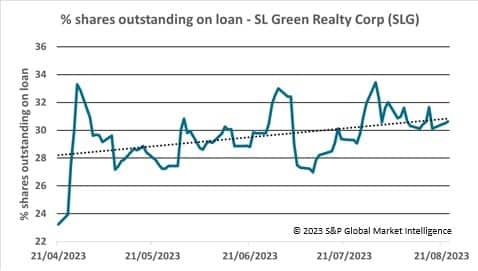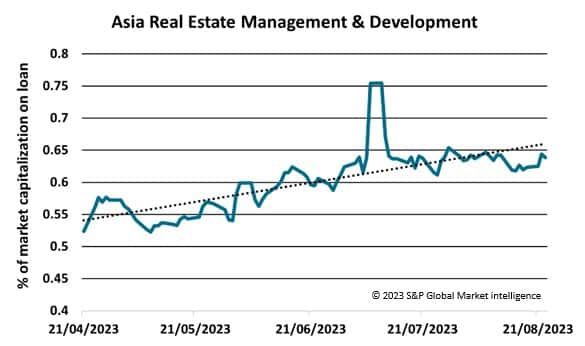Featured Topics
Featured Products
Events
S&P Global Offerings
Featured Topics
Featured Products
Events
S&P Global Offerings
Featured Topics
Featured Products
Events
S&P Global Offerings
Featured Topics
Featured Products
Events
Financial and Market intelligence
Fundamental & Alternative Datasets
Government & Defense
Professional Services
Banking & Capital Markets
Economy & Finance
Energy Transition & Sustainability
Technology & Innovation
Podcasts & Newsletters
Financial and Market intelligence
Fundamental & Alternative Datasets
Government & Defense
Professional Services
Banking & Capital Markets
Economy & Finance
Energy Transition & Sustainability
Technology & Innovation
Podcasts & Newsletters
EQUITIES COMMENTARY — Sep 08, 2023

By Matt Chessum
As interest rates have continued to climb over the last twelve to eighteen months so has short interest across the property sector. Not only has the increase in interest rates decreased potential buyers' purchasing power whilst simultaneously increasing the risk-free rate of return for investors, but following the working from home revolution that was adopted during COVID, office space remains under-utilized, and companies are looking to downsize to reduce costs. A shift to online shopping throughout the pandemic has also decreased demand for commercial real estate as retailers continue to adjust their commercial strategies. The effects of this have recently been felt in the US with a decline in year-over-year (YoY) sales pushing share prices for some of the most popular US department stores lower. The current situation appears to have created the perfect storm for the property sector with more challenging trading conditions and lower share price valuations taking hold. In a recent economic survey by a large US bank, real estate was voted by 49% of survey participants to be the most likely source of the next "systemic credit" event.
This sentiment is currently being reflected across securities finance data sets. REITs in particular have generated significant interest from borrowers and continue to be the most shorted sector across global equities. As interest and occupancy rates have been popular headlines throughout the post-COVID period, REIT stock prices have been trading at circa 20-30% under their net asset values. Currently, across global equities, short loan value as a percentage of market capitalization stands at 1.57%. To put this in context, financial services is the second most shorted sector globally and short loan value as a percentage of market capitalization stands at 80bps - nearly half as much as REITs. Short interest across the REIT sector appears to be concentrated across the Americas and Europe. In the US, REITs are the second most shorted sector just behind financial services. Despite a recent rise in the share price, SL Green Realty Corp (SLG) is currently the most shorted REIT across US equities with 30.63% of its outstanding shares on loan. This company is responsible for acquiring, managing, and maximizing the value of Manhattan commercial properties. The property sector remains an important indicator of the New York State's economic activity as commercial rents and commerce provide both revenues and jobs for the State treasury. In the US in particular, the property sector also remains exposed to potential refinancing difficulties as the US banking sector continues to consolidate after the collapse of three regional lenders earlier this year.

Across Europe, real estate management and development continues to be the most shorted sector. The property sector across Europe remains impacted by many of the issues facing the REITs in the US - high interest rates, an increase in online shopping and lower office occupancy rates. Long time special Samhallsbyggnadsbolaget I Norden AB (SBB B) remains the most borrowed property stock across the EMEA region with 24.17% of its outstanding shares on loan. Utilization in the stock remains high at 95.38%. Peach Property Group AG (PEAN), the Swiss property group, has also become more expensive to borrow over the past few months as demand for the stock has increased. Currently this stock has 11.08% of its outstanding shares on loan, is showing a utilization of 81.46% and is the second most expensive property stock to borrow across the EMEA region.
Across the APAC region, despite the property sector not even appearing within the top ten most shorted sectors, short interest continues to grow across the Asian property sector. Falling housing sales across the continent continue to put pressure on property stocks. Asian property companies that remain heavily dependent on mainland China have recently started to show signs of stress, as the decline in economic activity and the country's weakening economy add to the long list of potential problems that property companies currently face. Historically, mainland China has depended upon its property industry to help fuel its economic growth, accounting for approximately a quarter of the country's economic output.

Given the recent softening in economic data and increased chatter of central government stimulus, distressed developers in the region are once again coming under pressure from short sellers. The percentage of market capitalization on loan across the Asian property sector has been rising steadily since April this year, reaching a recent high of 0.75% at the beginning of July. Country Gardens Co Ltd (2007) has sparked particular interest over the past few weeks as the company missed an interest payment on its bonds and reportedly pulled its latest attempt to raise $300 million via a share offering in Hong Kong. Country Garden Holdings Co Ltd (2007) continues to be the most heavily borrowed stock within the sector as it faces $2.9B of debt repayments for the rest of the year, weighing heavily on its ability to retain liquidity and meet payment deadlines. Average borrowing fees continue to move higher as active utilization surpasses 90% and the percentage of shares outstanding on loan in the company surpasses 8.5% of the free float. Even though the People's Bank of China has agreed to extend outstanding loans across the sector, financial markets remain cautious of the sectors ability to manage its heavy debt burden whilst retaining the ability to generate value for investors.
As global economies start to react to the prospect of higher rates for longer and the world recalibrates following one of the largest and most profound economic shocks ever experienced throughout the recent pandemic, the prospects for the property sector may appear bleak. Despite this, given the fall in share prices, some consolidation has taken place throughout the sector strengthening companies' balance sheets and leading to opportunities for investors. As far as short sellers are concerned however, the property sector remains a firm favorite.
This article was first published on September 5th 2023 in Securities Finance Times Issue 335 based on the content provided by S&P Global Market Intelligence
S&P Global provides industry-leading data, software and technology platforms and managed services to tackle some of the most difficult challenges in financial markets. We help our customers better understand complicated markets, reduce risk, operate more efficiently and comply with financial regulation.
This article was published by S&P Global Market Intelligence and not by S&P Global Ratings, which is a separately managed division of S&P Global.